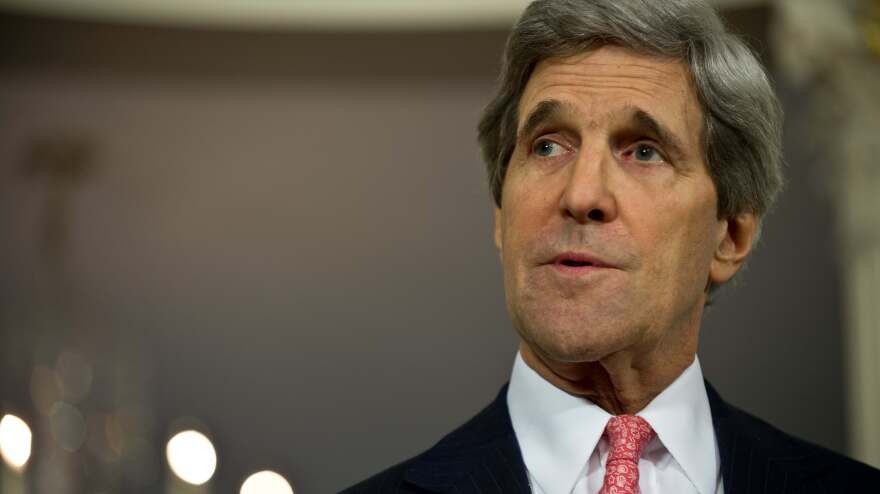John Kerry sets off Sunday on his first foreign trip as secretary of state, visiting Europe and the Middle East.
One dominant theme of the trip will be how to resolve the crisis in Syria, where an estimated 70,000 people have been killed over the past two years. Kerry is portraying his trip as a listening tour, and he expects to hear a lot about Syria.
He told reporters recently that he wants to talk with U.S. allies about how to persuade Bashar Assad to agree on peace talks that would end the Syrian leader's bloody rule in Syria.
"My goal is to see us change his calculation," Kerry said. "My goal is to see us have a negotiated outcome and minimize the violence; it may not be possible."
Kerry, however, needs to find out, says former State Department official Frederic Hof, now a senior fellow at the Rafik Hariri Middle East Center at the Atlantic Council.
"The primary purpose here, I think, is due diligence," Hof says. "It's to check an important box as to whether or not a peaceful, managed political transition in Syria, a negotiated process, is actually possible."
This past week, Russian Foreign Minister Sergei Lavrov, along with the head of the Arab League, offered to broker talks between the Syrian government and the opposition.
Neither side can rely on a military solution to the conflict, Lavrov argues, because "that's a road to nowhere, a road to mutual destruction of the people."
Lavrov will meet Kerry in Berlin this week, and Kerry will likely use the opportunity to encourage Russia to once again use its influence with Assad. Kerry will also be visiting Rome, where he will have a chance to meet Syrian opposition figures. Hof says Moaz al-Khatib, the Syrian opposition council leader, has made clear he's ready for negotiations.
"He asked for a major prisoner release, but he did not demand that Assad resign first," Hof says. "This is potentially very significant. He took a big risk with his own followers who understandably want Assad gone up front."
Hof has his doubts that this diplomatic effort will get very far, though, and if it doesn't, he says, the Obama administration will have to think again about how to support the opposition, whether with arms or intelligence sharing.
"If [Kerry] comes to the conclusion that there's [nothing] there, I suspect he will come back," he says. "He'll report to the president and he may well propose a significant readjustment of U.S. policy toward Syria and that might be the thing that could have the effect of changing Assad's calculation."
After visiting London, Berlin, Paris, Rome and Ankara, Kerry is to visit several Gulf states as well.
Aaron David Miller, the vice president of the Woodrow Wilson Center, says this is a relatively risk-free trip.
"It's safe centrist and very secretarial," Miller says.
Kerry does have one risky stop, Egypt, and experts will be watching how the new secretary deals with the struggling Islamist government there.
Copyright 2021 NPR. To see more, visit https://www.npr.org.



